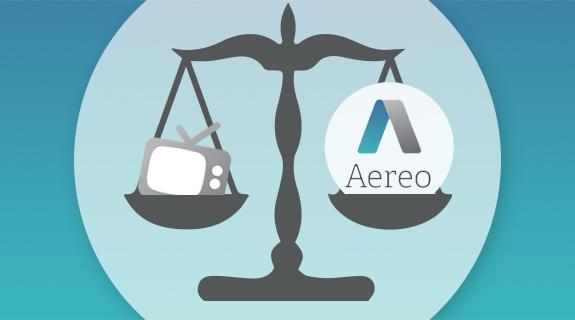Aereo lost its fight at the Supreme Court on Wednesday, with the justices ruling 6-3 that the startup service did, in fact, violate the Big Four broadcasters’ copyrights when the company captured their over-the-air signals and streamed them to smartphones and other mobile devices.
The ruling means the end of the line for Aereo, according to one of its chief backers, Barry Diller.
“We did try, but now it’s over,” Diller told CNBC shortly after the ruling was published. Diller had previously said that Aereo would be “finished” if they lost the High Court fight.
Each of the Big Four broadcasters had sued to put a stop to Aereo, which rents out a small antenna to users that transmits broadcast television to multiple devices such as smartphones.
The broadcasters argued the company is illegally retransmitting television; Aereo says it is simply renting remote antennas.
Writing for the court, Justice Stephen Breyer agreed with the broadcasters, saying that Aereo was, in fact, similar to the cable companies, which must pay hefty fees to retransmit broadcast signals. By taking those signals for free, Aereo was violating the Copyright Act.
“Insofar as there are differences, those differences concern not the nature of the service that Aereo provides so much as the technological manner in which it provides the service. We conclude that those differences are not adequate to place Aereo’s activities outside the scope of the Act,” Breyer wrote for the court.
The three most conservative justices, Clarence Thomas, Antonin Scalia and Samuel A. Alito, Jr., dissented.
Scalia penned the dissent, which had scant praise for Aereo but said the company was just exploiting a loophole in the law.
“It is not the role of this court to identify and plug loopholes,” Scalia wrote.
The National Association of Broadcasters hailed the ruling, especially since it seemed to cast aside Aereo’s characterization of the industry as stifling innovation. Supporters of Aereo had said that a ruling against the startup could have a negative effect on the booming cloud computing sector, since it utilized similar technology.
“NAB is pleased the Supreme Court has upheld the concept of copyright protection that is enshrined in the Constitution by standing with free and local television. Aereo characterized our lawsuit as an attack on innovation; that claim is demonstrably false. Broadcasters embrace innovation every day, as evidenced by our leadership in HDTV, social media, mobile apps, user-generated content, along with network TV backed ventures like Hulu,” said NAB President and CEO Gordon Smith in a statement. “Television broadcasters will always welcome partnerships with companies who respect copyright law. Today’s decision sends an unmistakable message that businesses built on the theft of copyrighted material will not be tolerated.”
Aereo founder and CEO Chet Kanojia said the company would continue its “fight,” but gave few details on how the company would proceed.
Before Wednesday’s ruling Aereo was available in Austin, Houston, San Antonio, Dallas-Fort Worth, Boston, Miami, Detroit, Baltimore, and Cincinnati. Several hours after the Supreme Court decision on Wednesday, Aereo’s website was still touting future expansion plans to 19 new cities:

Read More: US Supreme Court, The Washington Post, The Hollywood Reporter:
Previous Aereo coverage on Brief: A Comprehensive Guide to Tuesday’s Aereo Supreme Court Argument; Justices Seem Skeptical of Aereo at Supreme Court; Diller: Aereo ‘Finished’ If We Lose at Supreme Court;
Brief Take: The broadcasters are given a huge win by the justices, and erases any last doubt that Aereo is, in fact illegal.
Tags:













































__twocolumncontent.jpg)











